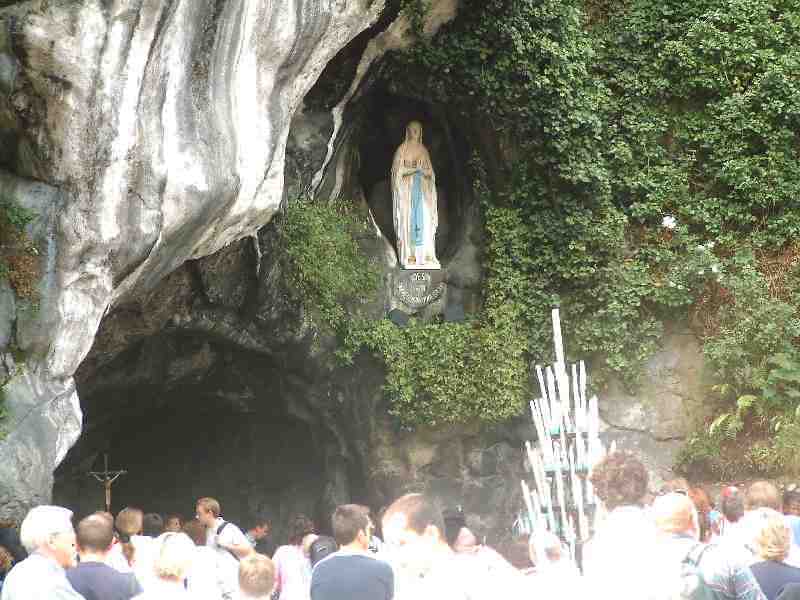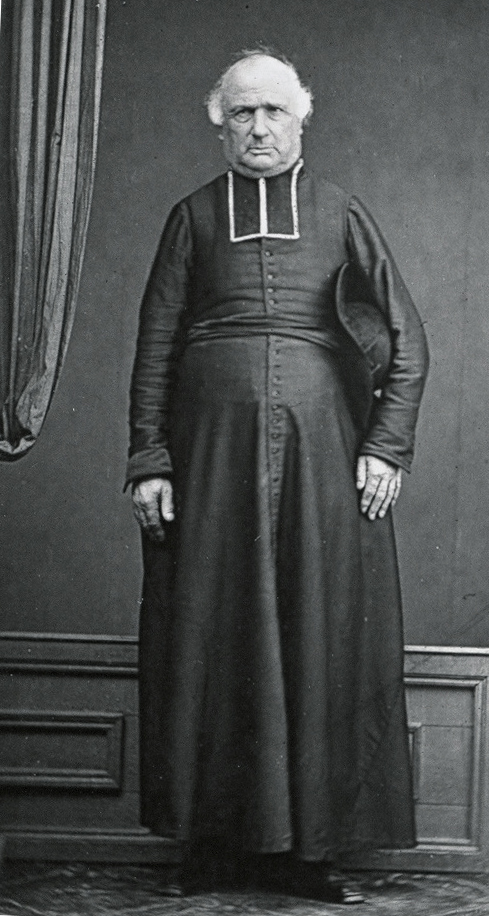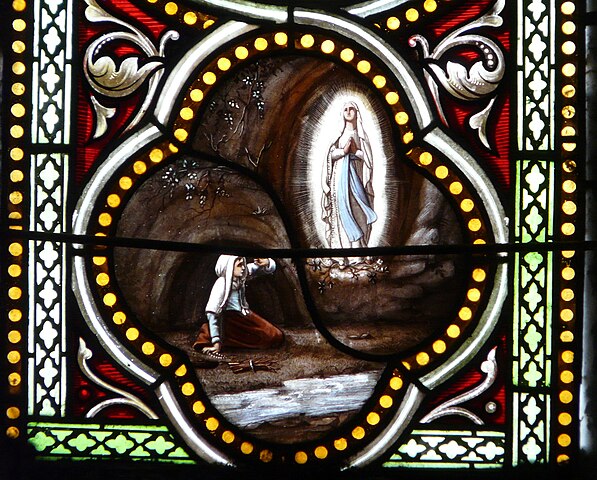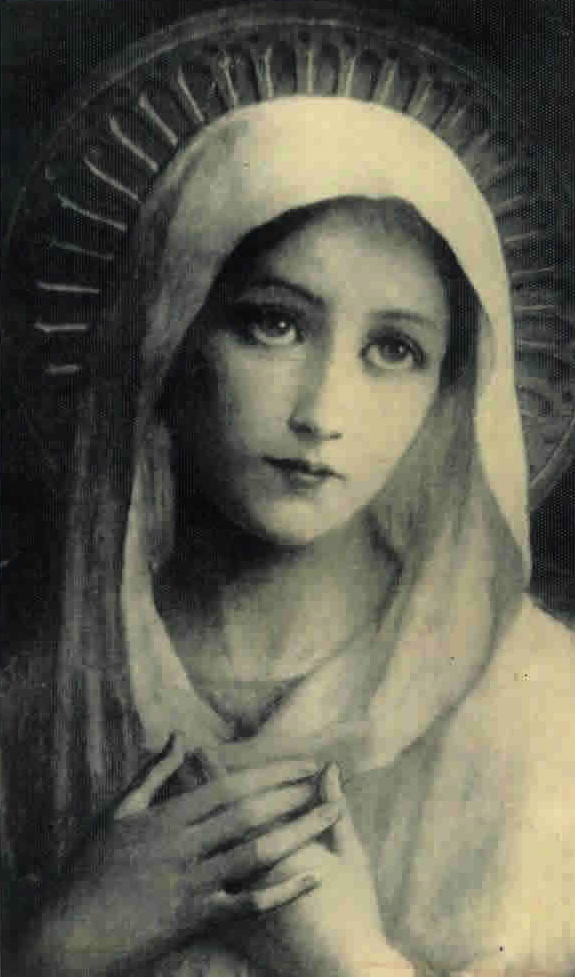
The Song of Bernadette is a detailed account of the story of St. Bernadette Soubirous, the terribly poor young peasant girl of Lourdes, who received the Apparitions of the Blessed Virgin Mary.
The book is beautifully written and a pleasure to read. The Jewish author, Franz Werfel, learnt of of St. Bernadette, when attempting to escape from the the Nazis in 1940. He was led to the town of Lourdes and vowed to write her story, if he survived.
Werfel has written this true story as a novel. In his preface, he states:
In face of the events here delineated, the sceptical reader will ask with better right than in the case of most historical epic narratives:
What is true? What is fiction? My answer is: All the memorable happenings which constitute the substance of this book took place in the world of reality … their truth has been confirmed by friend and foe and by unbiased observers.
My story makes no changes in this body of truth. I exercised my right of creative freedom only where the work, as a work of art, demanded certain chronological condensations or where there was need of striking the spark of life from the hardened substance …
I vowed that I would evermore and everywhere in all I wrote magnify the divine mystery and the holiness of man – careless of a period which has turned away with scorn and rage and indifference from these ultimate values of our mortal lot.
The author has indeed magnified this ‘divine mystery’, whereby the young simple peasant girl, Bernadette, is startled to find herself the graced recipient of these astonishing Apparitions.
And he has most definitely ‘struck the spark of life’ into the text, flooding it with colour, richness and excitement. It is not easy to put this book down.
Our Lady of Lourdes and St. Bernadette
So what is The Song of Bernadette? Bernadette sings of her experiences with the beautiful lady, as she calls her.
Through the succession of Apparitions in the grotto of Massabielle, St. Bernadette experiences the most exquisite love – the heavenly love of our Blessed Mother.
She obeys the Lady, scratching the ground to unearth a miraculous spring, whose continuous flow procures countless healings – from then till the present day …
Whilst pilgrims flock from near and far, to these miraculous waters, they also come to witness Bernadette’s face, transfigured during the Apparitions. For Bernadette’s face becomes a reflection of the heavenly beauty before her.
Yet, sometimes they witness a different expression. For, they also see her face express the deep sorrow of the Virgin’s heart. As Bernadette is profoundly disturbed when she experiences Our Lady‘s pain – pain inflicted by the sin of the world: our sin.
It is then that Bernadette hears the Lady’s cries for ‘Penance’ and her pleas to pray for sinners.
The Song of Bernadette is naturally centred on the life of the Saint and these Apparitions, yet its pages contain far more than just this. For the book details the consequences these Apparitions have upon the community and even the French nation. Many characters become involved with these events.
So, whilst this book brings to light this remarkable story, where the gates of Heaven opened to this simple young girl and through her, to the townspeople of Lourdes, it also provides a valuable testament to the history of that period.

And that history is related through the characters – many of whom are caught up in struggles for power, where pride is their driving force. For example, the Mayor, the Head of Police, the Schoolmaster, the Doctor and the Parish Priest. Each is ashamed of what is happening at the grotto of Massabielle. And each wants to use his power to either deflect the embarrassment or crush it.
Werfel cleverly paints the story of St. Bernadette, through the eyes of characters such as these. And in so doing, many subsequent themes come into focus. The deep suffering nature of humanity is revealed, through extreme poverty and severe ailments of the body. Also divulged are the ailments of the soul – those sufferings caused by pride, scepticism and a general lack of faith.
For St. Bernadette’s story hardly ends with the Apparitions. She is exposed to countless attacks, interrogations and ridicule.
And this leads into the political situation within France at that time. A time, Werfel wrote, ‘which has turned away with scorn and rage and indifference from these ultimate values of our mortal lot.’
For in 1858, dire conflict existed in France between two sides of the population. On the one side were those who favoured the French Revolution and who were generally highly sceptical of and hostile to the Faith – and on the other those who were horrified by the Revolution and faithful to the Church.
Bernadette was actively persecuted by the protagonists of Revolutionary France – but she eventually found support from Catholic France.
On the Character of St. Bernadette

Yet the book also illumines the transformative power of Heaven, even with the most sceptical of souls. For, whilst relating the exquisite beauty of the Apparitions, it also illustrates the grace these heavenly visits bestow upon the whole community.
We witness this through the intimate workings of conversion within the psyches of many characters in the book – characters whose lack of morality is utterly disturbing.
Amongst all these, only Bernadette herself seems to display morality and even then, she remains unconscious of the fact. This is a huge part of her appeal, in that she does not ‘try to be good’, she simply is good.
And it is this goodness, which brings her unhindered through barrages of abuse and interrogation, which would render most people powerless.
Her loyalty to truth and her simplicity merge, producing a sweet young woman, who is simply not understood. For, she is unable to play the games that most people play – games of power, games of pride.
And her adherence to her own naturalness is that which begins to transform the community in which she lives and wherein she becomes its most famous resident. Yet her humility is such, that she is totally unaware of her great and saintly reputation.
This story is so incredibly touching. It is also deeply tragic. For the levels of suffering these poor peasant people endure cannot fail to wrench the heart. The poverty, the toil and strife, the illness and the subsequent consequences that each entail for the human person are beyond anything Westerners know today.
Bernadette herself was brought up in one of the poorest homes in Lourdes, where the family of six lived in one room, the Cachot, which had been the former prison of the town.
The damp, which thrived in the cold wet atmosphere of this prison, had plagued Bernadette since a young child. She therefore grew up suffering terribly from asthma. Yet, whilst she suffered she seemed unperturbed, so caught up was she, in her own world.
For, Bernadette was a dreamy child. And this dreaminess affected everything, including her schooling. As the oldest child at school and at home, she appeared backward, as was very simple in her learning.
Yet her strong resolve and her lack of understanding as to why people stray from the truth, gave her a very strong character. She possessed a deep wisdom, beyond most who came into her company.
St. Bernadette Encounters the Blessed Virgin Mary

The moments where Bernadette encounters the Lady, as she herself calls the Blessed Virgin, are written exquisitely.
These passages sent shivers down my spine, as though something of the original event is captured in Werfel’s words. The author evokes an atmosphere, wherein one feels almost present at the scene, smelling and sensing the surroundings.
Such an example is the first Apparition, which occurred on the 11th February, 1858. Bernadette was in the grotto of Massabielle, on the outskirts of Lourdes. There, she encounters the Lady.

In the pointed niche of the rock cavern there dwelt a deep radiance … And in this remnant of billowing light stood someone who had come from the very depths of the world … a very young lady, delicate and dainty, visibly of flesh and blood …
She stood calmly … without touching side or arch in the narrow oval of the niche … her easy, snow-white raiment was so cut as to indicate her delicate waist-line … Wavy ringlets of light brown hair escaped from under the veil. A fairly broad blue girdle … fell down over the knee.
But what a blue! … the young lady’s feet were bare … two golden roses were placed above the beginnings of the slender toes of each foot …
Bernadette felt … in an embrace and one desired this embrace to last for ever …. One might call it comfort and consolation …moment by moment now she was more deeply swathed in this consolation … which was a hot flood of compassion … the utter sweetness of this compassion penetrated her shivering body …
She was conscious of nothing but the undreamed-of beauty of the lady’s image, with which she was intoxicated … The beauty of the lady was the first and last thing which had unlimited power upon this child and held her enthralled.
Since this first encounter, Bernadette is in love with the beautiful Lady and nothing else in the world matters to her. Even the prospect of jail does not bother Bernadette.
All she cares about is that the Lady is honoured and obeyed. But most important of all to Bernadette, is knowing that the Lady loves her.
And in her own way, she tests this love and is repeatedly assured that the Lady does indeed most deeply love Bernadette. The most beautiful account of this love, comes in the final Apparition, which occurred on July 15th,1858.
It is almost sunset and Bernadette senses that the Lady is going to appear, so runs to the grotto …
Even the interior of the grotto … [is] flamed with the sunset. Or did it flame with a quite other fire? … veritable clouds of golden glow seemed to issue forth. And yonder moving whiteness …
For the first time the lady stood with her inviolate waxen feet upon the flat earth. The roses on those feet were radiant. More than ever was the lady … a creature all youth, all floating, dainty maidenhood …
Today the lady harboured in her heart no aims beyond the radiation of love. Today for the first time was the full and undivided love of her who brought such bliss turned wholly toward her who needed to absorb it …
Bernadette … sank wholly into contemplation, more deeply than she had ever done … as though she had to fill the chambers of her soul with what she saw, as though she must … store away the object of her vision in every cranny of her being … for Bernadette knew this was farewell. But the lady, too, was giving her utmost. She offered and she gave herself in steady waves, drawing close and closer to the very boundary of the possible …

Our Lady of Lourdes Calls for Penance …

Werfel also realistically captures moments of danger, felt by Bernadette during the Apparitions.
For there are times, when Bernadette becomes aware that demonic forces are close by. These moments alarm the Lady.
In one such passage, Werfel describes an experience of evil the lady senses coming from the river Gave, which flows past the grotto. As Bernadette kneels before the lady, she feels her disturbance. She is oblivious to the huge crowd around her, praying the Rosary.
Bernadette seemed to hear nothing. A quite other noise sounded in her ears. Once more the Gave seemed in rebellious spate. Once more a rout in panic terror seemed to race across the river, comparable to the echo of galloping horses and rattling vehicles; once more the piercing cries arose: Flee, flee … Avaunt from here!
Fearfully Bernadette raised her arms toward the lady, whose countenance for the first time was stern and proud, as though her pilgrimage also was not at an end, as though she too had still to wage battles and vanquish her enemies.
With wrinkled brow she looked attentively at the river, as though to tame it with her eye’s radiant blue. The uproar yielded at once. The hoarse voices crashed into silence. The immemorial rumbling and foaming of the Gave came to the lady’s heel like a daunted wolf.
The Lady often looks deeply saddened or perturbed by these interruptions and Her face becomes stern. It is in these moments that she utters the well-known call to ‘Penance, Penance, Penance”.
Bernadette acutely feels the Lady’s sadness and immediately acts, desperate to alleviate the Lady’s suffering.
She makes the sign of the cross, prays her rosary and even slides across the stones, causing her knees to bleed. Bernadette longs for the throngs of people who have come to witness the Apparition, to imitate her acts of penance, to further alleviate the Lady’s suffering.
St. Bernadette: Beautiful Soul

Werfel paints a beautiful picture of Bernadette. Her large, brown eyes, soft voice and humble stance are evoked repeatedly and shown to soften even the hardest of hearts.
For instance, Bernadette’s teacher, Sister Marie Therese Vauzous, is a harsh character whose strictness attempts to crush the life out of any young girl or woman placed in her care.
Near the end of the book, the miraculous nature of the love of the Lady, working through Bernadette, effects sister Vauzous’ conversion. Her pride softens and her doubt in Bernadette and the lady, disappears.
Also, the Priest of Lourdes, Marie Dominique Peyramale, is converted. He was a staunch opponent to the visions, yet becomes Bernadette’s gentle giant of a protector. It was through his influence that Bernadette found her way into cloistered life.
She became Sister Marie Bernarde, of the Sisters of Nevers and stayed there until her death.

Conversion through Our Lady of Lourdes

One of the most moving parts of the book for me comes in the closing section. Hyacinthe de Lafite, a character who lived in Lourdes at the time of the Apparitions, left the town. In this passage he returns, to find a very different Lourdes. As with all his writing, Werfel paints this scene and character most richly.
Hyacinthe de Lafite is a poet filled with romantic notions. His motto in life could be described as this – don’t commit to anything. To remain uncommitted is the only way to retain individuality. In fact, he left Lourdes because he felt pressured by the Lady to decide either to believe in Her or not. He wanted neither.
This character is therefore neither religious, nor anti-religious, for he sees both as a trap. Therefore he does not side with either the Republic or the Church, considering himself to be free.
When he returns to Lourdes, he is shocked to see the changes to the town.
Lourdes has been transformed into a pilgrimage site, filled with shops selling religious artefacts.
What is more, a huge hospital has been erected. And Lafite is taken on a tour of this hospital.The descriptions of the inhabitants can move one to tears. For the Hospital of the Seven Sorrows is where the sick, the deformed and the incurable live. Day in, day out, they await in hope for a miracle to effect their healing.
Yet, what is most touching in this account, is Lafite’s own realisations.
He has cancer of the Larynx and the tour of the hospital has a profound effect on him. It brings home his own fate.
He is then drawn towards the grotto itself, where he encounters a typical scene at Lourdes, a Priest leading the faithful in prayer.
De Lafite is deeply affected by the recitation of the Litany of the Blessed Virgin. As each line is intoned, the sceptic begins to feel the truth of the meaning of these titles. It is as though he instinctively knows that the Blessed Virgin is, of course, all that the Litany proclaims Her to be.
This passage is so moving for me. For, as a convert myself, I recognise that profound moment of realisation that one is a sinner. This moment is so precious, for it humbles one before God. It softens the heart and the mind, bringing one to one’s knees. It is a moment of deep penitence.
And here we find that Lafite is speaking silently, as though to his doctor friend, Clarens. He speaks as if he were confessing and then begins to address the Blessed Virgin herself.
In this silent conversation, Lafite admits to Clarens that he has cancer and his days are numbered. But he reveals something that weighs far more heavily upon him:
But in my heavy nights, Clarens, I’ve come upon a far more ghastly thing … the knowledge that I’m the greatest sinner in the whole world …
I’m not talking about the thousand sins of slackness and weakness with which my soul is stained day by day. I’m talking about the … pride which stood at the very cradle of my mind …
I was too proud to be beholden to anyone or anything … Out of pride I wanted to be …independent to an insane degree …
I was to be the fruit of myself … If I did not acknowledge God, it was because I could not endure not being He …
My sin, Clarens, was the sin of Lucifer … my pride has destroyed me.
Lafite continues this imaginary dialogue, as the Litany is recited.
‘It’s perfectly logical,’ Lafite sighed … ‘My desolate aloneness is a logical result. For I have loved no one. No one and nothing’ … he had, without knowing it, come face to face with the grotto …
His empty eyes stared into the disappearing hollow … the bodily discomfort that had tortured him for hours disappeared … the prayers of men took Hyacinthe de Lafite into their midst … O maternal power of the universe, O morning star!
The support came nearer him. The prayer behind him seemed to lay many gentle hands upon him …
Without any other sensation than that of the fading of his shame … Lafite … sank upon his knees and murmured into the grotto of the lady the familiar words of the angel’s greeting and of his mother’s lips and his own childhood …
In a peace unknown to him, Lafite remained thus until night … but ere he arose, there came to his lips, he knew not how, the invocation: ‘Bernadette Soubirous, pray for me!’
Foreword for Monarchy by Roger Buck
St. Bernadette’s Holy Death

As Hyacinthe de Lafite invoked this prayer, Bernadette lay on her deathbed. Her life has been miraculous and she has never recovered from the grace she was bestowed. She truly experienced love from the greatest creature there ever was, the Blessed Virgin Mary, and this love has sustained her to the end.
Still such a humble and simple soul, she does not understand why she deserved this incredible grace.
Her poor small body has been wracked not only by asthma, but also tuberculosis of the bone, a most painful illness, which she endured for seven years or more.
Yet she did not think she had suffered enough.
Werfel brings to life intense afflictions of conscience in the poor bed ridden nun. For example, she cries out in agony that she did not do enough to help her mother, when she was young.
It is as though she has to purify every corner of her soul before her death.
Knowing that she is soon to depart from this world, she calls upon her gentle giant, Dean Peyramale, who arrives promptly.
Surrounded by her fellow nuns, who pray for their beloved sister, we say farewell to Bernadette. Werfel writes this account of her death most beautifully, through the eyes of the Priest:.
Bernadette’s eyes flashed strangely into the void … sought a farther distance and suddenly a great thrill made her body quiver and a new strength lifted her up.
Therewith came, long echoing, … the cry of her confession: ‘J’aime … I love …’
Deeply as a stricken bell the word vibrated in the room. It was so great a cry that the prayers ceased and all was silenced … Commonly death extinguishes a human face in the twinkling of an eye.
But death illumined the face of Bernadette Soubirous. At the very moment of her last breath her countenance assumed the aspect of the ecstasies, as though through all the sights and things of the world she had remained bound to the lady of her vision.
‘J’aime.’ That confession of love did not fade from the consciousness of Marie Dominique Peyramale. He was still kneeling by the door without motion …
All life seemed marvellously light to Peyramale and the lightness communicated itself even to his own massive body. He utterly forgot that he was still kneeling on his elderly rheumatic knees. Only gradually did he begin to suspect how deeply this death had refreshed his vital powers. All things had changed. All things had changed. Could any sting or bitterness ever again assail him? …
And daylight and candlelight played over the eternally remote face of Bernadette. Peyramale could not bear to leave this sight. To his own surprise he heard himself whispering: ‘Your life begins, O Bernadette.’ …
With youthful lightness the huge man arose. With a last look and a last sign of the cross, he said farewell to Bernadette and turned and went.
Foreword for Monarchy by Roger Buck
Buying Books at Amazon Through These Links Gives Us a Commission. This Supports Our Apostolate. Thank You if You Can Help Us Like This!












Comments
comments are currently closed
3 responses to “The Song of Bernadette by Franz Werfel (Review)”
[…] in a book review I posted on Franz Werfel’s The Song of Bernadette, I wrote the […]
[…] The intensity of this moment is captured by Franz Werfel, in his wonderful book, The Song of Bernadette, which I’ve reviewed here. […]
[…] of her life, I have found the fullest, best account of St. Bernadette’s character in The Song of Bernadette by Franz Werfel (which I’ve reviewed here). Whilst Werfel has written it as a partly- fictitious novel, his account remains based on the […]